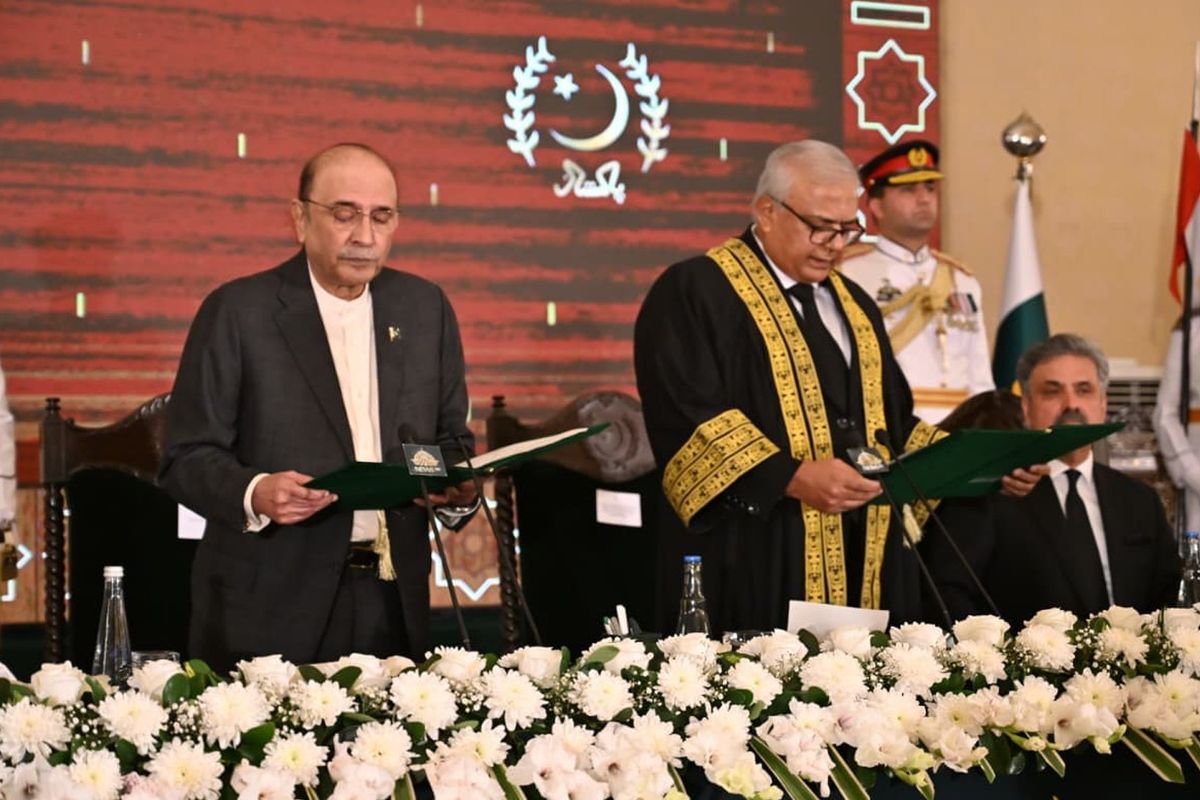Justice Aminuddin sworn in as first chief justice of Pakistan’s new Constitutional Court
Pakistan government also appoints six judges to the new Federal Constitutional Court
News Desk
The News Desk provides timely and factual coverage of national and international events, with an emphasis on accuracy and clarity.

Aamir Abbasi
Editor, Islamabad
Aamir; a journalist with 15 years of experience, working in Newspaper, TV and Digital Media. Worked in Field, covered Big Legal Constitutional and Political Events in Pakistan since 2009 with Pakistan’s Top Media Organizations. Graduate of Quaid I Azam University Islamabad.

President Asif Ali Zardari administering the oath to Justice Aminuddin Khan as Chief Justice of the Federal Constitutional Count at Aiwan-e-Sadr in Islamabad on November 14, 2025.
PID
Justice Aminuddin Khan was sworn in Friday as the first chief justice of Pakistan’s newly established Federal Constitutional Court, a landmark institution created under sweeping constitutional reforms approved a day earlier.
The ceremony took place at the Aiwan-e-Sadr, the presidential residence in Islamabad. Senior political leaders, cabinet members and top military officials attended the ceremony.
Among those present were PPP Chairman Bilawal Bhutto-Zardari, Deputy Prime Minister Ishaq Dar, National Assembly Speaker Ayaz Sadiq, Senate Chairman Yousuf Raza Gillani and PPP leader Aseefa Bhutto-Zardari.
Chief of Army Staff Gen. Asim Munir also attended, along with Supreme Court Chief Justice Yahya Afridi, President Asif Ali Zardari and Prime Minister Shehbaz Sharif, who were seated on the stage with Justice Aminuddin.
President Asif Ali Zardari administered oath to Justice Aminuddin Khan as Chief Justice of Federal Constitutional Court at Aiwan e Sadr. Prime Minister Muhammad Shehbaz Sharif, Field Marshal Syed Asim Munir (NI(M), HJ) Chairman JCSC & chiefs of Air Force & Navy also attended. pic.twitter.com/ls1TjtduSF
— The President of Pakistan (@PresOfPakistan) November 14, 2025
The ceremony opened with a recitation from the Holy Qur’an. President Zardari then administered the oath.
Justice Aminuddin’s appointment was made a day earlier under Clause 3 of Article 175A, read with Article 175C, of Pakistan’s Constitution. The appointment became effective upon his oath-taking.
What will FCC do?
The Federal Constitutional Court, or FCC, was revived as part of the judicial reforms in the 27th Constitutional Amendment. Officials say the new court is designed to reduce the Supreme Court’s caseload, speed up constitutional adjudication and strengthen judicial independence.
According to officials, the FCC will include six additional judges. Justice Aminuddin will administer their oaths at a separate ceremony at the Islamabad High Court, where preparations have been made in an open area between the judges’ block and administrative building.
Sources said the ceremony for the FCC judges will take place at the Islamabad High Court, following Justice Aminuddin’s own oath at the presidential residence.
The swearing-in comes as Pakistan moves quickly to implement the 27th Constitutional Amendment, which introduces major changes to the country’s judicial and military structures.
President appoints six FCC judges
Meanwhile, the government has formally notified the appointment of six judges to the Federal Constitutional Court.
According to a notification issued by the Ministry of Law and Justice, the appointments were made by the President of Pakistan under the powers granted by Article 175-A(3) read with Article 175-C of the Constitution.
The notification, signed by Secretary Law Raja Naeem Akbar, has been circulated to federal offices, including the Prime Minister’s Office, the President’s Secretariat, the Judicial Commission of Pakistan, the Supreme Court Registrar, and registrars of high courts across the country.
The appointed judges, effective from the date they take oath, are:
1.Justice Syed Hasan Azhar Rizvi
2.Justice Aamer Farooq
3.Justice Ali Baqar Najafi
4.Justice Muhammad Karim Khan Agha
5.Justice Rozi Khan Barrech
6.Mr. Arshad Hussain Shah
The establishment of the FCC, separate from the Supreme Court, was introduced through recent constitutional amendments aimed at restructuring Pakistan’s judicial framework and assigning constitutional matters to a specialized court.
Federal Constitutional Court becomes functional
The Federal Constitutional Court formally became operational with the induction of its judicial members. Chief Justice Amin-ud-Din administered the oath of office to three judges during the official ceremony: Justice Hasan Azhar Rizvi, Justice Aamer Farooq, and Justice Ali Baqar Najafi.
The newly formed bench is expected to commence work on significant constitutional matters in the coming days.
27th amendment sails through parliament
A day earlier, the National Assembly approved a series of legislative updates required to align Pakistan’s defense and judicial laws with the amendment. The decisions were announced after a meeting chaired by Prime Minister Sharif at Parliament House in Islamabad.
The reforms include updates to the Pakistan Army Act, Pakistan Air Force Act and Pakistan Navy Act. These changes bring the legal framework of the armed forces in line with Article 243 of the Constitution, which governs military command and control.
The revised framework establishes a new position — the Chief of Defense Forces, or CDF — who will serve as the unified commander of Pakistan’s army, navy and air force.
Officials confirmed that the post of Chairman Joint Chiefs of Staff Committee, currently the top inter-services coordination role, will be abolished once the incumbent retires. The transition marks a shift toward a single, consolidated military command structure under the CDF.
The amendments also introduce new honorary titles: Field Marshal for the army, Marshal of the Air Force for the air force and Admiral of the Fleet for the navy.
Cabinet members were told that the changes aim to meet modern strategic requirements and ensure that Pakistan’s defense framework can respond to evolving security challenges.
The federal cabinet also approved the draft Federal Constitutional Court (Procedure and Practice) Act, 2025, which will regulate how the new court operates. The FCC is tasked with resolving constitutional disputes and safeguarding the separation of powers between state institutions — a responsibility previously handled by the Supreme Court.
Key features of the 27th amendment
The 27th Constitutional Amendment restructures major parts of Pakistan’s constitutional and institutional framework.
It creates a new Federal Constitutional Court, separate from the Supreme Court, dedicated exclusively to constitutional interpretation and disputes between the federal government and provinces.
It amends Article 243 to establish the Chief of Defense Forces as the principal military adviser to the prime minister and federal cabinet.
It also updates defense-related laws to reflect a more unified military command structure.
According to the government, these reforms aim to modernize civil-military relations, clarify the roles of state institutions and strengthen democratic oversight of the armed forces.







Comments
See what people are discussing